
Narendra Modi gestures as he arrives at BJP headquarters in New Delhi.
Credit: Reuters Photo
Whichever way the final results rest, it should by now be clear that the people of India have rejected the Modi-ised version of the BJP. The BJP has not got majority on its own steam and has to that extent been contained. Even if the BJP-led NDA forms the government at the Centre, it opens the possibility of a heavily-chastened BJP being forced to bow to the diktats of coalition politics since its partners will acquire new strength and will likely demand key portfolios.
To that extent, the days of a command-and-control obsessed, military-style BJP riding roughshod over sentiments across the political spectrum may be over. No more can this be the party of one path, one election, one man, one truth. The people of India, particularly voters across Uttar Pradesh, West Bengal and Maharashtra, have ensured that the BJP learns some key lessons about the rainbow of colours that go into the making of white light.
This is the least that the 2024 elections bring, with the possibility of many other twists and turns that are in the news, including important questions on the ability of Modi to continue at the helm even if the government is led by the BJP. The hollowed-out party, by now unused to raising any challenge or asking any questions of its leadership, will take some time to absorb the results and will likely look to the RSS for cues to raising an internal revolt, an event not as unlikely as it looked just a day ago.
Further, the reported threats under which some of the poll alliances have been signed by the Modi-led party, an example being the ugly manner in which Uddhav Thackeray’s Shiv Sena and Sharad Pawar’s NCP were broken in Maharashtra, leaves open the possibility of breakaway factions returning to their base parties and the NDA itself shrinking.
This is not to exclude the possibility of Narendra Modi, threatened by the election results, seizing more control and doubling up on Opposition-bashing, along with the politics of vendetta that has been the hallmark of the party for the last several years. This brook-no-opposition tendency can bring new twists to the post-poll scenario. The first speech of Modi at the BJP headquarters late Tuesday evening indicated that he is not particularly humbled by the result and used the word “Modi ki guarantee” once again, though voters have told him that they haven’t bought into it. Time will tell if this is a put-on bravado or an indication of more Modi-style politics to come, and if it comes after a backroom endorsement from the RSS or is indeed a ploy to checkmate opposition building against him internally. What was not to be missed, however, was the point made by Modi that this will be a “NDA sarkar” – a self-declared and a telling change from everything Modi that the party and its politics have been reduced to thus far.
From the election promises that were called “Modi ki guarantee”, to a series of schemes, projects, institutions and even a cricket stadium, Modi will go down as the person who took over a party and put it in service of, and for, one man – himself -- consumed by a self-love on the one hand, and bitterness that saw him sink the political discourse to a new low, on the other. The capture of a party that once claimed a breadth of leadership, the promotion of only those who serenaded Modi, and the competitive communalism that was used to burnish credentials and as a shortcut to limelight, power and the leader’s benevolence, are all a part of the story that built the myth of the Modi magic. Since it was all tied to Modi and his trusted No 2, Home Minister Amit Shah, the blame for all that has gone wrong at the hustings will also rest on the shoulders of the two who together are derisively referred to as the ‘1.5 leaders’ of the BJP.
It is not out of place to mention that a large part of the fall of the BJP from the self-declared lofty targets that it set for itself is directly linked to the arrogance of the ‘1.5 leadership’. Maharashtra stands out as an example. Modi called Sharad Pawar “bhatakti atma” (a directionless soul) after driving a wedge in his family; he called Uddhav Thackeray, the son of Bal Thackeray a “nakli heir”, injecting a new level of venom into a political divide. Yet, none of this need have been if Modi-Shah had allowed Thackeray to become Chief Minister after the last Assembly elections. By refusing to give him the post, they forced Thackeray to befriend the Congress-NCP, and then they split the Shiv Sena to claim victory – always looking to put down whoever comes in their way.
This approach has been in play at other levels with other partners, a result of which is that the ‘1.5 leadership’ is not trusted, is seen as playing dirty tricks, and is seen as using partners only to gobble them up. The controversy forcibly kicked-up in Odisha against Chief Minister Naveen Patnaik on his health was equally negative, and left a bad taste. It is another matter that they have succeeded in dislodging him from his long-held position.
The results also show that even the BJP’s huge money power – gained through an unconstitutional scheme like Electoral Bonds -- is not enough to win hands down. In that, it is a reminder of the wisdom of V P Singh, who once said: “In India, you can lose an election for want of money, but you cannot win just because you have money.”
(The writer is a journalist and faculty member at SPJIMR. Views are personal) (Syndicate: The Billion Press)